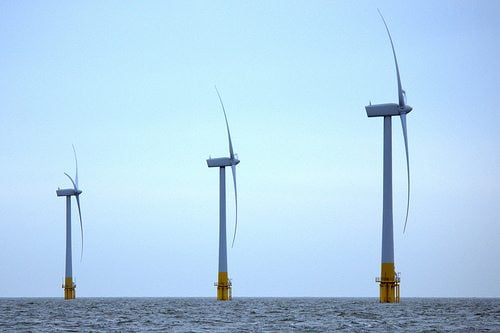

Energy
Use it or Lose it: UK has Offshore Assets and Opportunity to Meet Zero Carbon Ambitions
The UK Government is planning tighter climate laws to deliver net zero carbon emissions – but how? A new report shows how the UK’s unique assets can be used to support this ambition cost-effectively through carbon capture and storage (CCS) but warns that this opportunity must be grasped now, with strategic policy to regain lost momentum.
As MPs and external stakeholders meet today [Wednesday] at Westminster to discuss the potential for industrial CCS in the UK – and in light of the Government’s development of its 2050 industrial decarbonisation roadmaps – the report presents the expertise and opportunities that can create a viable route to a zero carbon economy. These include:
- Retaining skilled jobs and creating new industries at clusters of industrial emitters around the UK coastline, with plans already developed for shared-cost CCS “hubs”
- A globally significant and exceptional North Sea geological asset for CO2 storage
- An oil and gas workforce that routinely delivers high-quality infrastructure and could build a new offshore CCS industry serving the UK and Europe
- An enviable research & development community with its amassed knowledge and strategic international collaborations
- Large-scale CCS projects poised to decarbonise industry and power generation
The report also highlights the potential cost to taxpayers of delaying CCS deployment, the loss of crucial infrastructure through North Sea decommissioning and the risk of a “brain drain” of expertise to countries where CCS is already being delivered.
Download report: http://www.sccs.org.uk/achieving-a-lowcarbon-society
The Scottish Carbon Capture & Storage (SCCS) report derives from its 2015 annual conference, which brought together policymakers, industry, academia and representatives from Scottish, UK and European governments. It shows how low-carbon, competitive economies can be rapidly and uniquely assisted by CCS.
The authors have called for a reset of objectives and ambition in the UK, and recommend a concerted effort by industry, government and academia in four key areas:
Delivering industrial CCS: Many industries can decarbonise at a low capture cost, but that still outweighs the current carbon price. If the UK Government wants to retain industry, it should develop funding mechanisms for CCS as a top-up to the carbon price. An East Scotland Low Carbon Zone, potentially in partnership with Teesside, could provide industrial emitters with access to CO2 transport and storage facilities and support the creation of production hubs future-proofed against the rising cost of emitting carbon.
Genuinely CCS-ready power: If gas-fired power generation forms a sizeable proportion of UK demand, in line with government policy, then future plants must be genuinely CCS-ready, unlike the simplistic assessments made now, and their siting assessed alongside the viability and cost of pipeline and/or shipping connections to suitable CO2 storage sites. The decommissioning of North Sea infrastructure means the door is closing fast on reusing equipment to access storage sites.
Clarity on cost: A correct statement of the cost of CCS occurs only when capture costs are separated from transport and storage. At present, the first CCS projects are expected to bear the full cost of infrastructure despite the fact that follow-on projects would benefit from this development. This creates an uneven playing field against other forms of low-carbon power, such as offshore wind or nuclear.
A Scottish CO2 Hub: The development of a CO2 collection and storage hub in Scotland could unlock a CCS industry serving both the UK and Europe, providing access to extensive storage in the Central North Sea at low financial risk. By using cost-effective shipping, this can support the collection-and-dispatch hubs envisaged for mainland Europe and Scandinavia, and could be expanded sequentially on a project-by-project basis.
Professor Stuart Haszeldine, SCCS Director, said: “We must never lose sight of our ultimate goal – a zero carbon future for the UK as part of international efforts to contain global warming. We welcome the UK Energy Secretary’s recent commitment to tightening climate law to enable this ambition, but these good intentions will hit a significant problem if we delay the deployment of CCS any further. The stark reality is that net zero carbon is unachievable without CCS.
“In the UK, we have an enviable set of unique offshore assets that, if used now rather than decommissioned, will deliver a least-cost pathway to a competitive, low-carbon economy. Any delay risks creating a considerable burden for UK taxpayers further down the line, as well missing the opportunity to build a homegrown CCS industry that can support the climate actions of other countries.
“The progress and potential of CCS in the UK is much more than a government competition. Our report describes why we need to get one of the most obvious and effective climate change tools back on track and highlights the strengths and opportunities that the UK – and Scotland, in particular – possesses.”

Continue Reading

 Environment12 months ago
Environment12 months agoAre Polymer Banknotes: an Eco-Friendly Trend or a Groundswell?

 Features11 months ago
Features11 months agoEco-Friendly Cryptocurrencies: Sustainable Investment Choices

 Features12 months ago
Features12 months agoEco-Friendly Crypto Traders Must Find the Right Exchange

 Energy11 months ago
Energy11 months agoThe Growing Role of Solar Panels in Ireland’s Energy Future




























